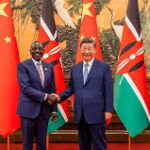By Judy Maina
NAIROBI, Kenya – In a sharp escalation of diplomatic tensions, Kenya on Monday lodged a formal protest with Tanzania after former Justice Minister Martha Karua was deported while attempting to attend a high-profile political trial in Dodoma.
Ms. Karua, a prominent opposition figure and constitutional lawyer, had traveled to Tanzania to observe the trial of Tanzanian opposition leader Tundu Lissu.
According to Kenyan officials, she was detained upon arrival and immediately deported without explanation.
Adding to the diplomatic fallout, former Chief Justice Willy Mutunga and two Kenyan civil society activists were also reportedly held by Tanzanian authorities at Julius Nyerere International Airport in Dar es Salaam.
The group had intended to attend the same proceedings in solidarity with Mr. Lissu, a longtime critic of President Samia Suluhu Hassan’s administration.
The Kenyan Ministry of Foreign Affairs issued a strongly worded statement demanding the “immediate and unconditional release” of the detained Kenyans and calling the deportation of Ms. Karua “a violation of diplomatic norms and the spirit of regional cooperation.”
“These actions are not only unacceptable but risk undermining long-standing relations between our two nations,” the ministry said.
The Tanzanian government has yet to issue an official response. However, sources in Dar es Salaam suggest the move was motivated by concerns over foreign interference in sensitive domestic political matters.
Regional analysts say the incident could strain relations between the two East African neighbors, both of whom are key players in the East African Community (EAC). Kenya is reportedly preparing to raise the issue at the next EAC Heads of State summit.
This is not the first time Tanzania has drawn criticism for restricting access to foreign observers and human rights monitors during politically sensitive events.
Mr. Lissu, who survived an assassination attempt in 2017, remains one of the most vocal opposition figures in the country.
Meanwhile, rights groups across East Africa have condemned the incident.
“Tanzania’s treatment of respected legal and civil society figures from Kenya sends a dangerous message about regional repression and the shrinking space for democratic solidarity,” said a spokesperson for the Kenya Human Rights Commission.
As of Monday evening, Mr. Mutunga and the two activists remained in custody. Kenyan officials said consular access had been requested but not granted.
The incident marks a dramatic low point in Kenya-Tanzania relations, which have historically oscillated between cautious cooperation and rivalry.
Observers say how swiftly and diplomatically both countries manage the fallout will determine whether the current standoff evolves into a wider regional rift.





